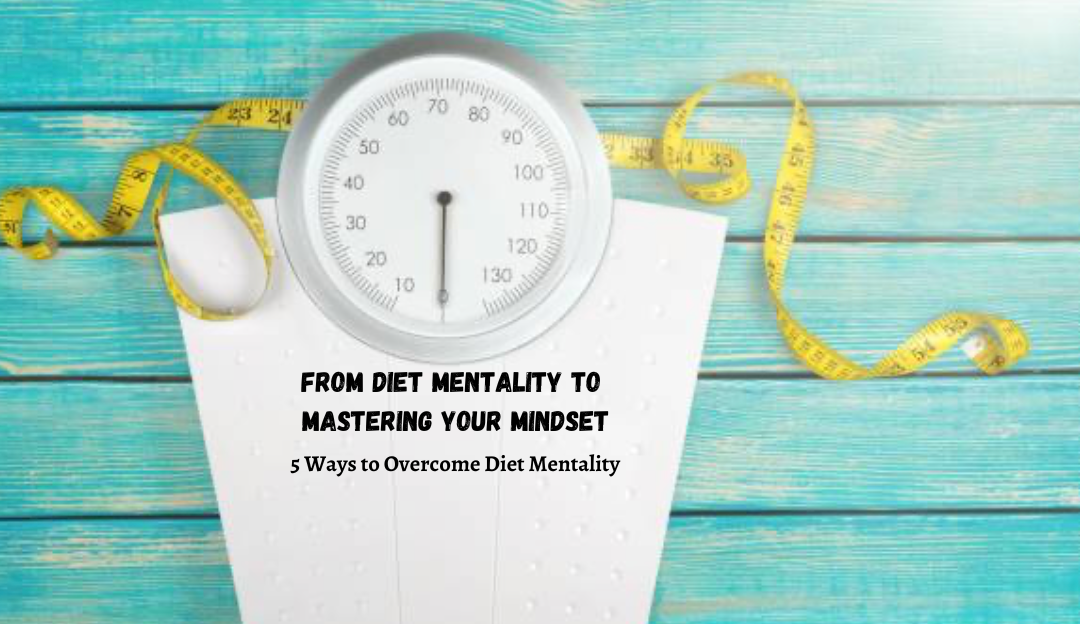My old coach used to say, “Change your thoughts, change your world.” Although it may seem a bit cliché by some, it carries profound truth and psychological significance. While it might sound simple, its meaning delves into how our mental outlook and inner dialogue shape our perception of reality and our external experiences.
I can’t think of anything that could impact our health more than our mental outlook and the inner talk we have with ourselves on a daily basis. At The NutritionFix Coach, mindset is one of the five foundational pillars, what I like to call the Five to Thrive (accompanied by nutrition, exercise, sleep and stress management). When working with 1:1 clients, or even in a group coaching session, beginning with Mindset is a must.
Let me tell you why.
No lasting change will ever happen if you are stuck in your limiting patterns of thinking. Reframing old beliefs and habits, and replacing them with new behaviors can create transformative change. This is called a paradigm shift.
Having a paradigm shift about your health and wellness means changing the way you fundamentally think about food, nutrition, and health. Instead of viewing eating as something driven by convenience, pleasure, or habit, a paradigm shift involves seeing food as nourishment that fuels your body, enhances your well-being, and empowers you to live your best life. This shift can lead to long-lasting, sustainable changes in your diet because it is rooted in a new mindset rather than temporary motivation.
Let me break down a few ways to be successful when it comes to mindset and diet mentality.
1. Shift Your Mindset: From Dieting to Nourishment
Old mindset: Eating is about weight control or temporary quick fixes (e.g., crash diets, eliminating food groups or detoxes).
New mindset: Food is the foundation for my health and vitality. It has the power to heal many ailments in my body. It’s about long-term nourishment and feeling good, not just about looking good or hitting a specific number on the scale.
Steps to Incorporate:
Educate Yourself: Learn to be inclusive of foods that will nourish your body. The more you include quality foods into your diet, the less room you will have for poor choices. Understanding that whole foods like fruits, vegetables, lean proteins, and whole grains provide essential nutrients for energy and longevity can help shift your thinking from calories to quality.
Focus on Long-Term Health: Set health goals that focus on your well-being rather than aesthetics. For example, aim to improve digestion, increase energy, or reduce inflammation through your eating habits.
2. Change Your Language: Food as Fuel
Old mindset: “I’m restricting myself” or “I can’t eat that.”
New mindset: “I’m choosing foods that fuel my body” or “I’m nourishing myself with the best choices.”
Steps to Incorporate:
Reframe Your Inner Dialogue: Instead of saying, “I can’t have dessert,” say, “I choose to eat fruit because it is full of antioxidants and nutrients that are so good for me.” This subtle shift turns healthy eating into a positive, empowering decision rather than a restriction.
Practice Gratitude for Food: Each time you eat, take a moment to appreciate the food in front of you and how it will benefit your body. This helps create a healthier emotional connection to food.
3. Change Your Environment: Build a Healthy Food Culture
Old mindset: “I eat whatever is available” or “Convenience drives my food choices.”
New mindset: “I create an environment where healthy choices are easy and accessible.”
Steps to Incorporate:
Stock Your Kitchen with Whole Foods: Keep your fridge and pantry full of nutrient-dense options, such as fresh (or frozen) produce, whole grains, lean proteins, and healthy fats. When healthy food is more accessible, you’re more likely to reach for it.
Meal Prep: Take time to prepare meals or prepare food groups like proteins by grilling chicken or fish in advance to avoid grabbing fast food or processed snacks when you’re short on time. Meal prepping can help reinforce the idea that eating healthy is part of your routine.
4. Shift Your Identity: From Emotional Eating to Mindful Eating
Old mindset: “I eat based on how I feel (stress, boredom, celebration).”
New mindset: “I eat based on what my body needs and the health goals I have set for myself.”
Steps to Incorporate:
Practice Mindful Eating: Slow down while eating, paying attention to your hunger cues and the experience of eating. This helps you differentiate between emotional hunger and physical hunger, and it shifts eating into an intentional practice.
Build Self-Awareness: Keep a food journal to track not only what you eat but also how you feel before and after meals. This can help you become more aware of how food impacts your emotional and physical state. If this sounds like too much work, try to journal when you are about to mindlessly reach for a snack, or about to have a binge session. This will allow you to recognize patterns in your eating habits that may have nothing to do with actual hunger.
5. Cultivate a Growth Mindset: Small Changes, Big Results
Old mindset: “I have to overhaul my diet overnight” or “Eating healthy is too hard.”
New mindset: “I can start small, and small changes add up over time.”
Steps to Incorporate:
Start with One Small Habit: Begin by incorporating one small change, such as drinking more water, eating an extra serving of vegetables, or swapping sugary snacks for healthier options. At The NutritionFix Coach, one motto that is said often is, “Small habits done daily yield BIG results.” Gradual, consistent change leads to greater success because it sticks over time.! Sustainability is key!
Celebrate Progress, Not Perfection: Focus on the small wins and progress, rather than striving for perfection. For instance, celebrate the fact that you ate a balanced breakfast all week, even if you slipped up with dessert a couple of times. This reinforces positive behavior. Remember, changing your diet practices is not linear, we all have hiccups in our journey.
By adopting this shift, eating better becomes less about following strict diets or rules and more about creating a lifestyle rooted in wellness, mindfulness, and long-term sustainable health. Instead of focusing on specific goals (e.g., lose 10 pounds), a paradigm shift can lead to creating identity-based habits: “I am a healthy person,” “I prioritize my health daily” and “I choose nourishing foods.” This helps in forming long-term habits rather than temporary changes. This allows you to redefine your success, so it is attributed to your consistency, wellbeing, and how you feel overall. You will most likely see the results you were looking for in the first place!
Your Health & Wellness Fix,
Carole J. Carus
Click here to visit my Beacons page! You can subscribe to my weekly newsletter there. All good things coming your way!

